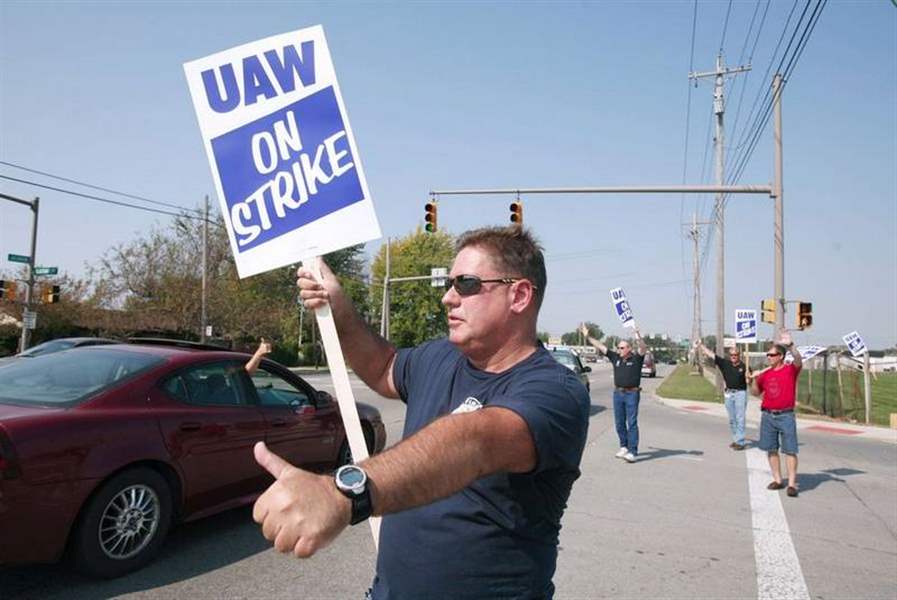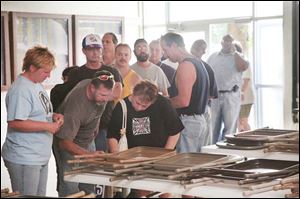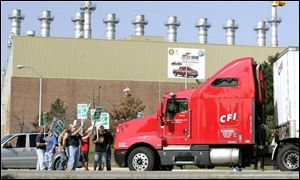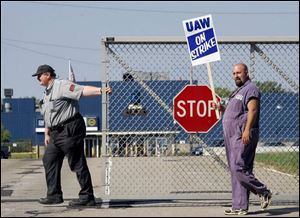
UAW strikes at GM plants, idles 1,850 Toledo workers
9/25/2007
Keith Kitchens and other GM employees, walk the picket line at Toledo Powertrain on Jackman Road.
DETROIT The first nationwide strike against General Motors Corp. in 37 years has begun because the United Auto Workers union wants job security, an issue the company will find difficult to promise.
UAW officials said the 73,000 UAW members who work at about 80 U.S. facilities for the nation s largest automaker struck at 11 a.m. yesterday because they want GM to promise that future cars and trucks, such as the still-on-the-drawing-board Chevrolet Volt plug-in electric car, will be built at U.S. plants, preserving union jobs.
At GM s Toledo Powertrain factory, emotions were mixed.
Some were angry with the company for what they believe was unfair bargaining. Others were shocked that negotiations broke down, 10 days after the last agreement expired.
I m surprised that it came to this, said Marc Schwartz, a 34-year employee at the plant on Alexis Road that makes four-speed transmissions for cars and trucks. There are no winners in a strike. Nobody gains when something like this happens,
Nobody wants to go on strike. But we ve got to take a stand, said Mike Chittenden, a 23-year Toledo Powertrain employee. The factory has 1,850 workers on two shifts.
Similarly, at GM s Powertrain foundry in Defiance, strikers went to the picket lines. The factory has 1,540 workers on three shifts.
The nationwide walkout was the first at GM since 1970, when a two-month strike idled operations at GM plants.

Autoworkers sign in at the UAW hall on Jackman Road. Many voiced surprise as well as determination about the strike.
The strike will cost GM about 12,200 vehicles per day or 760 per hour, according to the auto forecasting firm CSM Worldwide. A protracted strike could force GM to burn through $8 billion a month, Lehman Brothers analyst Brian Johnson said.
Some industry analysts doubted a strike would occur. But as bargaining stretched days past the Sept. 14 expiration of the prior contract, the union said the pace needed to be quickened. It set the deadline late Sunday night.
Job security is one of our primary concerns, UAW President Ron Gettelfinger told reporters after talks broke off and the strike began. We re talking about investment and we re talking about job creation and preserving benefits, he said.
Talks resumed a short time later as sign-carrying pickets marched outside plant gates, but weary bargainers stopped to rest around 8 last night. Talks were to resume this morning.
An agreement between GM and the UAW would become the pattern for pacts with Ford Motor Co. and Chrysler LLC. UAW workers at those companies are not on strike.
The walkout, Mr. Gettelfinger said, did not occur because of a proposal to shift the retiree health-care burden from the company to the union. The union said it didn t strike over wages.
UAW leaders confirmed the job action was over job security.
The strike puts GM, which is restructuring so it can better compete with Asian automakers, in a bind as some of its new products begin to catch on with consumers. But it also means workers are taking a big risk giving up pay and slowing down GM in an uncertain economy.
Worker Anita Ahrens burst into tears as hundreds of employees streamed out of a GM plant in Janesville, Wis., just after the strike began.
Oh my God, here they come, she said. This is unreal.
She and her husband work at the plant, and they have three children, including one in college. She worried about paying her bills.
Mike Sarra, a new employee when the UAW last struck GM in 1970, said he was fortunate to have worked for the company for so long and to have experienced only two walkouts.

Autoworkers block a truck at a General Motors facility in Pontiac, Mich. About 73,000 GM workers went on strike nationwide.
Obviously, this is not good on our pocketbooks, said the Toledo Powertrain worker and Swanton Township resident. We still have mortgages and bills to pay and families to support. I can t go on indefinitely without a paycheck.
A 10-year employee of the Toledo plant, Carole Cheney believed that the economic and health-benefit issues facing workers were too important not to strike.
We work too hard to be getting a pay cut, she said. GM had a dream, and the UAW made that dream come true. Now they want to ditch us.
The paychecks Doris Smith received during her 37 years with General Motors helped put some of her children through college. She said she wanted to continue to work to build her nest egg for retirement.
I am not happy with GM. They didn t negotiate with us. I think it all came down to pay, said Ms. Smith, 66, of Toledo. I am not happy with walking out. But you got to do what you got to do.

A guard closes a gate at the General Motors plant in Parma, Ohio, as autoworker Anthony Pesce pickets.
The striking workers will receive $200 a week plus medical benefits from the UAW s strike fund. The union had more than $800 million in that fund as of last November, according to the UAW s Web site. A fund of that size would last about a year at $200 a week for 73,000 striking workers.
Health-care trust
The UAW, Mr. Gettelfinger said, is willing to talk about taking money from the company to form a trust that would be responsible for billions of dollars in retiree health-care costs.
GM wants the trust, called a Voluntary Employees Beneficiary Association, or VEBA, so it can move much of its $51 billion in unfunded retiree health-care liabilities off the books, potentially raising the stock price and credit ratings. It s all part of the company s quest to cut or eliminate about a $25-per-hour labor cost disparity with its Japanese competitors.
This strike is not about the VEBA in any way, shape, or form, Mr. Gettelfinger said.
Industry analysts said initially the strike would have little impact on consumers because GM has sufficient inventory stockpiled for most of its products.
But yesterday, the Teamsters transportation union said its 10,000 automotive transport members would not cross UAW picket lines to deliver GM cars and trucks.
GM reported that it had just under 950,000 vehicles in its inventory at the end of August, about 35,000 below the same time last year.
Tom Libby, senior director of industry analysis for J.D. Power and Associates, said even a short strike could hurt the company because its new crossover vehicles, the Buick Enclave, GMC Acadia, and Saturn Outlook, are selling well and in short supply.
The momentum they ve established for those products would be interrupted if there s a supply interruption, he said. There s not a lot of inventory available to sell down. So they need to keep that pipeline full.
GM had about a 65-day supply of cars and trucks as September began, versus a 71-day supply at the same time last year, said Paul Taylor, chief economist for the National Automobile Dealers Association. The Enclave, he said, is at a tight 24-day supply.
If the walkout goes beyond 36 hours, forecasting firm CSM Worldwide expects vehicle production in Canada to be affected because of a lack of U.S.-built engines and transmissions.
Concessions cited
The strike is a positive development, Brett Hoselton, an analyst at KeyBanc Capital Markets in Cleveland, wrote in a report. We believe the work stoppage will be short-lived and is being used by the union s leadership as an instrument in preconditioning the constituency to accept more concessions, not fewer.
The walkout could further damage the image of the UAW, David Cole, chairman of the Center for Automotive Research in Ann Arbor, said shortly before the strike began.
What it says is the union is the same old militant organization, Mr. Cole said. What is a real concern is buyers [who] punish a union by not buying the products they build.
GM likely has threatened to pull investments out of the United States if the union does not agree to its terms, he said.
Mr. Gettelfinger, in his post-walkout news conference, said the union has done a lot to help the struggling GM, including health-care givebacks in 2005. But during the weekend, he said GM s stance hardened.
It was going to be General Motors way at the expense of the workers, the UAW leader said. The company walked right up to the deadline like they really didn t care.
The union didn t want to strike, he said.
Who wins in a strike? But again, you can be pushed off a cliff, and that s what we feel like happened here, Mr. Gettelfinger said.
GM spokesman Dan Flores said the automaker was disappointed in the union s decision.
The bargaining involves complex, difficult issues that affect the job security of our U.S. work force and the long-term viability of the company, he said. We remain fully committed to working with the UAW to develop solutions together to address the competitive challenges facing GM.
The negotiations have occurred at a difficult time for both the automakers and the union. Detroit s automakers lost a collective $15 billion last year.
The union also is feeling pressure. UAW membership has fallen from a high of 1.5 million active members in 1979 to around 576,000 today.
Blade business writers Mark Reiter and Jon Chavez contributed to this report.